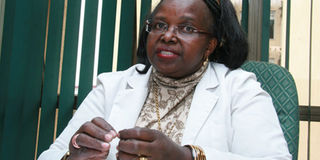Laws should punish rapists, not facilitate them

PHOTO | JENNIFER MUIRURI Dr. Jean Kagia during an interview with Sunday nation on July 2, 2014.
What you need to know:
- Tutors’ lobbies Kenya National Union of Teachers and the Kenya Union of Post-Primary Education Teachers have also condemned the Bill.
- Dr Kagia said it was not practical to propose condoms in situations of rape where the victim is told, “sit there as I put on a condom”.
The fireworks sparked by nominated Senator Judith Sijeny’s Reproductive Health Care Bill have failed to die down after a leading medical expert waded into the controversy.
The obstetrician and gynaecologist, Dr Jean Kagia, who specialises in childbirth and the treatment of medical conditions and illnesses that affect women, and usually relating to their ability to have babies, dismissed the senator’s arguments for sponsoring the Bill that has received widespread condemnation.
Among the leading personalities to speak against the Bill is Education Secretary Jacob Kaimenyi, who stated in a recent programme on Nation FM that the government will not support condoms and birth control pills for students.
Tutors’ lobbies Kenya National Union of Teachers and the Kenya Union of Post-Primary Education Teachers have also condemned the Bill.
In an emotive response to her critics published in this paper last Sunday, the senator alluded to a 23-year-old grandmother she knows, meaning her children are engaging in premature sex and therefore need contraceptives.
As a family lawyer, Ms Sijeny said, she had some horrific cases of children as young as 13 who were defiled and gave birth as a result.
Dr Kagia, who runs rescue homes for teens chased away by their families for becoming pregnant, faulted the legislator’s argument, saying, 23-year-old grandmothers was not news since her practice brings her face to face with 11-year-old mothers.
“What prevents such a child to have a child of her own at 22?” she asked. Indeed, early marriages, banned by the Children’s Act, are still widely practised by certain religious and cultural communities.
She noted that to defile a child is a criminal offence that should be tackled through the criminal justice system rather than giving condoms to little girls to facilitate their rape.
RETURN AFFILIATION LAW
“I would like the senator to come up with a policy that will deal with these criminals,” the doctor said and challenged the legislator to fight for the return of the Affiliation law. “Why don’t we tackle the right problem? The problem is not the girl getting pregnant; it is the man who makes her pregnant.”
The Nairobi gynaecologist’s practice brings her in direct contact with the trauma of a defiled child, which goes beyond pregnancy. It is about the girls’ injuries, the risk of infection, and the fact that the child’s body is not ready to carry a pregnancy.
Equally important is the fact that the man has committed a crime, and it is more important, she says, to stop the environment in which little girls are raped by concentrating on what is wrong with a society that perpetrates such ills.
She recalled the recent case in Molo where three girls on their way to school were raped and murdered resulting in a residents’ demonstration.
Dr Kagia said it was not practical to propose condoms in situations of rape where the victim is told, “sit there as I put on a condom”.
“It doesn’t make sense,” she said, adding: “Children don’t plan sex; they are caught up in it, and will have sex without insisting on condoms. She or he cannot use a contraceptive.”
A parent whose child is raped needs a P3 form to sue the molester not a condom to facilitate future attack, the doctor said. She also pointed out that premature use of oral contraceptives suppresses the development of ovaries which risks future fertility.
An issue that has angered critics of Senator Sijeny is the Bill’s proposal that parental consent is not needed when offering contraceptive services to children.
Such legislation, Dr Kagia says, would be contrary to the Children’s Act, which upholds parental responsibility. If a child goes to her, she said, and she discovers the girl needs an emergency operation and there is no relative around, she cannot sign a consent form herself because s/he cannot understand the implications of the operation.
“Now if a child cannot understand that she needs to go to a theatre to take out a baby who is going to be her child, how then is she capable of understanding things like contraceptives and practise using them?” Dr Kagia asked.
Dorothy Kweyu is a revise editor with the Daily Nation





